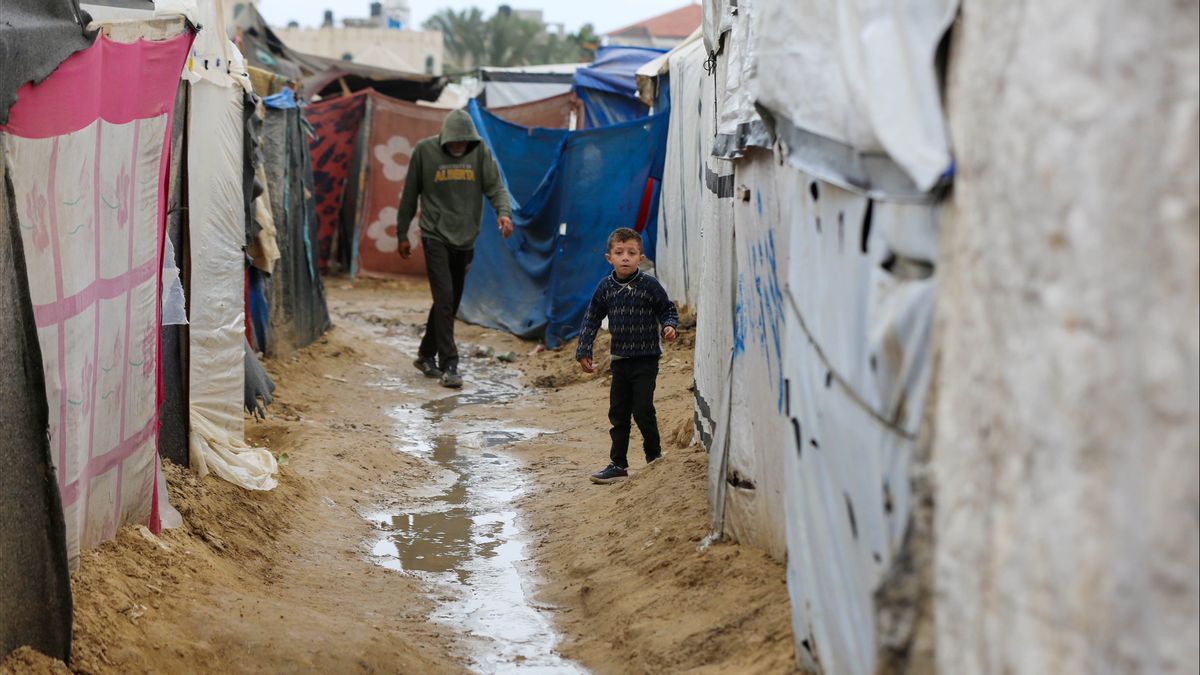JAKARTA - In a crowded refugee camp in Gaza, Ayman Siam places concrete blocks around the tent to keep his family dry from heavy rain that could add to their suffering amidst the threat of airstrikes, disease and hunger.
"I tried to protect my tent from the rain because we expected heavy rain. Three days ago when it rained, we got soaked," said Siam, trying to protect his children and grandchildren from the rain, Wednesday, November 27, quoted from AFP.
The rainy season has entered the Palestinian Gaza region without knocking. No exception at the Yarmouk sports stadium in northern Gaza, where Siam, his family and Gazans who were displaced from their homes have taken refuge due to the endless Israeli military invasion.
Siam lives temporarily in one of the dense, thin tents set up by refugees in the stadium. The location is no longer worthy of being called a sports arena with a view of the field like a mud field filled with puddles of water due to the rain. While a number of items are washed away around it.
The evacuees in the stadium dug small trenches around their tents, covered them with plastic sheets, and did whatever they could to stop the water from entering their bivouacs.
Others used shovels to direct the water into drains, as the sky continued to be overcast lately with the potential for more heavy rain.

The majority of Gaza's 2.4 million residents have been forced to flee, often moving between refugee camps as the Israeli military continues its attacks.
With many refugees living in tents, the winter is a serious concern.
Mahmud Bassal, a spokesman for Gaza's civil defense agency, said that "tens of thousands of displaced people, especially in the central and southern Gaza Strip, are suffering from the rains that have flooded their tents."
He also hopes that the international community will continue to provide tents and aid.
Meanwhile, international aid organizations have issued warnings about the potentially worsening situation for displaced Gazans as winter approaches.
"It's going to be a disaster," said Louise Wateridge, an emergency officer for the United Nations agency for Palestine refugees, or UNRWA, who is currently in Gaza.
The rainy season in Gaza is expected to last from late October 2024 to April 2025, with January 2025 being the wettest month with an average rainfall of 30 to 40 millimeters. Temperatures are likely to drop to 6 degrees Celsius. Amid the extreme weather, recent rains have flooded hundreds of refugee tents
"The rain and sea water flooded all the tents. We are helpless. The water swept away everything in the tents, including mattresses, blankets and water jugs. We could only get mattresses and blankets for the children," said Auni Al-Sabea, a refugee.
The English, Chinese, Japanese, Arabic, and French versions are automatically generated by the AI. So there may still be inaccuracies in translating, please always see Indonesian as our main language. (system supported by DigitalSiber.id)








